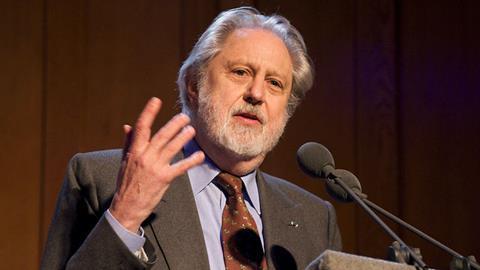The Labour Lord and former producer has addressed VPFs, Brexit and the potential for a new specialised BFI distribution fund in a wide-ranging speech to industry.

Labour Lord and former film producer David Puttnam has called for digital cinema integrators to reveal publicly when their Virtual Print Fee (VPF) schemes are due to end.
Puttnam was speaking today in his capacity as president of the Film Distributors’ Association (FDA) in the wake of a keynote address at an industry breakfast in London.
The VPF is the subsidy paid by distributors toward the digital equipping of cinemas. It remains a source of both controversy and uncertainty within the industry.
One integrator Arts Alliance Media recently told Screen that the terms of their VPF deals remain confidential.
However, the former Columbia Pictures chairman Puttnam told Screen today: “We don’t live in a world any longer where the cloak of confidentiality causes anything other than deep suspicion.”
“In a world where the Prime Minister and the Chancellor of the Exchequer will publish their own income tax returns, how much sense does it make for an integrator not to publish, for everyone to look at, the day on which their contracts expire and fees cease to become payable,” Puttnam said.
“I would like to think that the onus has got to be put on the integrators to come out from behind the cloak of confidentiality, put their cards on the table, say this is where we’ve got to, these are the interest payments payable, this is when they will be paid off and that’s the day on which the VPF will end.”
Earlier, in a wide-ranging speech to industry, Puttnam stated that it was “crucial” for the British Film Institute, with DCMS backing, to ensure “a fair independent and transparent resolution to this issue.”
Puttnam also praised the European Commission’s flexibility regarding another vexed issue, that of the Digital Single Market (DSM) and the principle of the territoriality of rights.
“I’ve got to know and like (Commissioner) Ansip. I think he totally gets it. With some pain and some inconvenience, I think they (the EC) have absolutely accepted that the problems that would be created if they press that (the end of the territoriality of rights) are ones they could really do without.”
Puttnam added that he “enjoyed and appreciated” the pragmatism that the Commission had shown regarding the DSM. “It’s one of the reasons I remain a really ardent pro-European. My experiences with the European Union is that they do end up with evidence-based solutions. The quality of the staff in the Commission is excellent.”
“These are not stupid people. I don’t think a ridiculous decision like Jeremy Hunt’s decision to scrap the UK Film Council would have been made in Europe. I think the checks and balances, the amount of evidence required to make a decision like that - it wouldn’t have happened. I get much more concerned about off-the-hoof decisions made by our own politicians than I am about Europe.”
In his speech, Puttnam also called for the BFI to create an enhanced distribution fund for specialised films and for distributors to be given “a super-charged role” to make the BFI’s Film Audience Network and regional hubs “a lot more effective.”
“Given the seismic changes buffeting the distribution business model, this kind of support is crucial if independent, specialised cinema programming is not to shrink even further over the coming years.”
He also recommended that the BFI’s distribution fund see greater recoupment from successful films:
“As audiences are, in practice, delivered film by film via distribution risk and investment, surely there’s an argument for a significant slice of any income received by the BFI from commercially successful, Lottery-funded releases to be re-allocated to the distribution fund.
Among other suggestions, he also called on the BFI to “urgently” fill the vacancy for a UK film distributor on the BFI board before deliberations over its ‘Film Forever 2’ plan are completed.

























1 Readers' comment